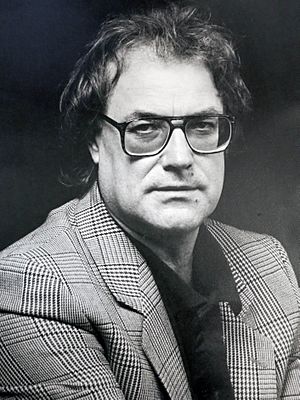Lordan Zafranović facts for kids
Lordan Zafranović (born 11 February 1944) is a famous Croatian film director. He is best known for his trilogy of films about World War II. These films are Occupation in 26 Pictures (1978), The Fall of Italy (1981), and Evening Bells (1986).
Zafranović is also known for his early black and white films. These films made him a major figure in a film movement called the Yugoslav Black Wave. He often bravely explored difficult historical topics in his work, such as the crimes committed by the Ustaše government in Croatia during World War II.
Contents
Early Life and Education
Lordan Zafranović was born in 1944 in Maslinica, a village on the island of Šolta in Croatia. At the time, the area was occupied by Axis forces during World War II. He spent his first two years in the El Shatt refugee camp in Egypt with his mother and older brother.
After the war, his family moved to the city of Split. He first studied ship-engineering. Later, he studied literature and fine arts at the Pedagogical Academy in Split from 1963 to 1967.
Film Career
Getting Started
Zafranović began making films as a hobby at Kino klub Split in 1961, when he was just 15. By 1965, he was working as a professional. He studied film directing at the famous FAMU in Prague and graduated in 1971.
He was one of five well-known Yugoslav directors who studied in Prague around the same time. Critics sometimes called them the Prague Film School, but they all had very different styles. They were good friends and represented a new generation of filmmakers in Yugoslavia.
Major Films and World War II Trilogy
Zafranović's early feature films were met with caution because of the difficult political situation in Croatia at the time. In 1973, he moved from Zagreb to Belgrade.
His big international success came with the 1978 film Occupation in 26 Pictures. The film is set in the beautiful city of Dubrovnik during World War II. It shows how the happiness of a wealthy family is destroyed by the arrival of fascist occupiers. The film was a huge hit in Yugoslavia and other countries. It won the Big Golden Arena for Best Picture at the Pula Film Festival. When the film was considered for an Academy Award, Zafranović was asked to shorten a very intense and violent scene. He refused, wanting to keep his artistic vision.
He continued his World War II trilogy with two more films:
- The Fall of Italy (1981) is set on his home island of Šolta. It tells the story of a young Partisan officer who is changed by power.
- Evening Bells (1986) follows a village man who becomes a Partisan fighter. He later ends up in camps in Nazi Germany and then in a Yugoslav prison after the war.
These films also won major awards at the Pula Film Festival.
Themes in His Work
Many of Zafranović's films explore how ordinary people deal with extreme historical events. Film expert Dina Iordanova said his films "challenge the deepest foundations of nationalism and question the justification of historical violence."
Because he dealt with difficult subjects, his films often caused debate. He made documentaries about the crimes of the Ustaše government during World War II. According to director Jasna Nanut, Zafranović's work is an "essential part of Croat cinematography."
Leaving and Returning to Croatia
In the late 1980s, just before Yugoslavia broke apart, Zafranović became involved in politics for a short time. Franjo Tuđman, who would become the first president of Croatia, criticized him for his films about the Jasenovac camp.
After Croatia declared independence in 1991, Tuđman called Zafranović an "Enemy of the Croatian people." Zafranović felt forced to leave the country. He settled in Prague and continued making films.
More than ten years later, he returned to Zagreb. He created a large TV series about Josip Broz Tito, the former leader of Yugoslavia, called Tito – the Last Witnesses of the Testament (2011).
He is currently working on a film called The Children of Kozara. It is based on a script he wrote in the 1980s. The story is about a young girl trying to survive in the Jasenovac death camp with her two younger brothers during World War II.
Selected Filmography
Here are some of Lordan Zafranović's most important films:
- Sunday (Nedjelja; 1969)
- Dalmatian Chronicle (Kronika jednog zločinca; 1973)
- Passion According to Matthew (Muke po Mati; 1975)
- Occupation in 26 Pictures (Okupacija u 26 slika; 1978)
- The Fall of Italy (Pad Italije; 1981)
- Angel's Bite (Ujed anđela; 1983)
- Evening Bells (Večernja zvona; 1986)
- Aloa (The ...' Festival) (Haloa (Praznik kurvi); 1988)
- Decline of the Century: The Testament of L.Z. (Zalazak stoljeća: Testament L.Z.; 1993)
- Tito – the Last Witnesses of the Testament (Tito – posljednji svjedoci testamenta; 2011, TV Series)
 | Audre Lorde |
 | John Berry Meachum |
 | Ferdinand Lee Barnett |


